|
This is the update of the Diva/Playboy situation from Suzanne Culph at Change.org. See my earlier blog post for some background on the issue.
"Huge news! Reports are coming in from supporters in Perth, Brisbane and Adelaide that Diva staff have been removing some Playboy products from display. The campaign is working - but Diva management continue to dig in their heels and are refusing to withdraw Playboy nationwide. Diva’s brand is taking a beating - both online and offline. They’re monitoring what their customers are saying about them online every moment. Taking a respectful message about why you signed the petition directly to Diva right now could tip the balance. Click here to post a personal message on Diva’s Facebook page. It’s important you speak from the heart about why this campaign matters - but if you need some help, here are some ideas on what to say: • Why you’re personally against promoting a porn brand like Playboy to girls. • As a parent and customer how it will influence your shopping decisions. • The impact of the porn industry on women and perceptions of women. The petition started by Collective Shout on Change.org has transformed into a movement of parents and shoppers, determined to hold Diva to account for pushing Playboy products on to young girls. And we’ve been phenomenally successful, some Playboy merchandise has been shoved under the counter “because of the controversy.” Diva’s General Manager Bianca Ginns continues to say they’re just following a fashion trend. Let’s make sure Diva know that selling the porn industry to young girls will never be fashionable - click here to share with Diva why you support the petition by posting on their Facebook wall. Thanks for all that you’re doing, Suzanne, for the Change.org team."
1 Comment
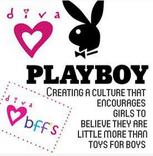 Diva is a budget Australian jewellery company popular with young girls - their ranges include Winnie the Pooh charm bracelets, Disney Princess pendants and Cute Cupcakes Best Friends necklaces. Recently they launched a range of Playboy jewellery - necklaces, rings, bowties, earrings – all come adorned with the popular Playboy bunny symbol. Suddenly Diva’s shop windows were plastered with Hugh Heffner’s porn symbol . Australian bloggers, activists, media commentators, TV and newspapers erupted in anger and controversy over Diva’s Playboy paraphernalia. Collective Shout explains Playboy’s marketing strategy: Playboy has succeeded in embedding its bunny logo on pencil cases, bed linen, cosmetics, jewellery, wallets, slippers and key chains, normalizing and sanitizing the Playboy insignia to children and young people. Playboy deliberately markets its brand to girls as cool fashion chic. Diva has become a willing participant in pimping the brand and its values to its young customers. Many of the Playboy products the company sells are decorated with sparkling diamantes or are in the shape of love hearts. There are ‘Playmate’ pendants and Playmate of the month necklaces (‘Miss January’, ‘Miss February’ etc), which invite girls to think of themselves as porn stars. One necklace depicts a Playboy bunny from her backside down. Her upper body, including her head, is missing. No longer merely a ‘soft-porn’ magazine, Playboy is now a billion dollar global brand profiting from the exploitation and subordination of women. Playboy Enterprises pornographic film titles include “Cum Drinking Sluts”, “Barely 18 Anal Virgins”, “Fresh Juicy Lolitas”, “Double Entry”, “Wait your turn, bitch!” These films and others depict women enduring body punishing and violent sexual acts for men’s sexual pleasure. Diva pretends this doesn’t matter. The Diva Facebook wall was overwhelmed with passionate arguments from both sides of the case. I want to share with you Dannielle Miller's case for what Playboy really means. 1. Playboy is not harmless, mainstream fun. It is not a cute little bunny. 2. Playboy is Hugh Hefner. He is 85. He lives in the Playboy mansion with his girlfriends, all at the same time. It’s not so much that he could be their father, more like their grandfather. Or great-grandfather. He ain’t that cool really, is he? 3. Playboy isn’t harmless or soft porn. As Collective Shout notes, some of Playboy’s films “depict women enduring body punishing and violent sexual acts for men’s sexual pleasure”. Some of their films have titles that are sickeningly degrading of teen girls and women... It is clear from the titles alone that this brand sells material that denigrates women and treats them as objects. 4. Criticism of Playboy isn’t a new thing. Writer and feminist Gloria Steinem exposed the truth of the Playboy Bunny’s life when she wrote a magazine article after going undercover to work at the Playboy Club almost 50 years ago. It wasn’t glamorous. It was badly paid, exploitative and denigrating. She pretended to the woman interviewing her for the bunny job that she had been a secretary. The interviewer looked at her and said, “Honey, if you can type, why would you want to work here?” 5. Playboy is not about women expressing their sexuality. It’s not about liberation. It’s about making money from women’s bodies. This marketing line on the Playboy site sums it up, really: “Get all these girls for 1 low price!” I lent my support to the various Australian individuals and groups voicing outrage and I signed Collective Shout’s petition for Diva to remove their Playboy range. I visited Diva’s Facebook page and voiced my dismay. As far as I was aware, Diva was an Australian company selling products in Australia and I wanted to support my Australian colleagues in their protest. Not a word about Diva was mentioned in the New Zealand media, or by any New Zealand blogger or commentator. Imagine my shock when walking down Wellington's Lambton Quay at lunchtime to be greeted by this sight: Yes, Diva and their Playboy bling are alive and well in New Zealand with 21 stores across the country. These are some products from their New Zealand website: It suddenly struck me: I had heard the Australian voices loud and clear – but where are the New Zealand voices standing up for New Zealand girls? Is it OK that Hugh Heffner’s failing porn company is being propped up by kiwi girls, some not even in their teens? What does a father say when their 10-year-old daughter delightedly shows them the new Playboy bowtie they bought at Diva with their pocket money? Do we want a company that exploits and degrades women to be developing brand loyalty in our little girls? I say no. Anyone else with me?
**NB: I am not anti-porn or anti-sex - I am anti-exploitation. I welcome comments and love to debate, but will cheerfully delete any comments that make personal attacks on anyone. Check out my comments policy if you need clarification. A couple of months ago Universal Royalty announced that they were heading to Australia. That's right, the company of 'Toddlers and Tiaras' fame decided that Australia needed to glitz up their kids, and they were the people to help! But there was a strong voice of opposition in Australia, and many voiced outrage at the proposal. Catherine Manning founded Pull The Pin and rallies were held all around Australia to draw attention to the pageants and the the harm they cause. The Royal Australian and New Zealand College of Psychiatrists have backed calls for child beauty pageants to be banned, saying they encourage the sexualisation of children and can cause developmental harm. The chair of the college stated "We're giving these kids messages that how they appear, how they perform and standards about what they're to come up to is actually more important than what they're like inside." Catherine is an Enlighten Education colleague of mine, and last week when Universal Royalty announced they were also New Zealand-bound, Catherine asked me to coordinate the Pull The Pin campaign in New Zealand. I felt honoured to be asked, and set up the Pull The Pin NZ facebook page. We are campaigning to end all child beauty pageants in New Zealand. It is our view that pitting young girls against each other in a competition based on physical beauty is potentially harmful to their development, and can lead to lowered self esteem and other conditions including eating disorders and depression. We are also concerned with the adultification and sometimes sexualisation of pageant entrants, and their engagement in adult cosmetic treatments such as waxing and spray tanning. We are calling on the government to legislate to stop parents and pageant organisers from exploiting children by enforcing age restrictions on beauty pageants and adult cosmetic procedures (unless for medical reasons). We will be co-ordinating public rallies once we have more information on when and where these pageants will be held. It's been fantastic receiving so much support on this issue - it is definitely a topic that many New Zealanders feel strongly about! New Zealand media coverage over the last couple of days:
And if you needed any more convincing that these pageants are NOT something we want to become a part of kiwi culture, check out this video featuring Universal Royalty's Eden Wood: Reading the Sunday newspaper over a coffee is an indulgence I absolutely love. Not being an avid sports fan, I usually give the sports section a miss. But last Sunday I picked up the Sunday Star Times sports section, because one of the issues I discuss with girls through my work with Enlighten Education is how the media portray women in sport. I had read research on the media’s treatment of women’s sport but I was optimistic that surely the situation couldn’t be quite that bad. So I opened the 16-page sports section and started flicking through. Men’s rugby, men’s soccer, men’s rugby, men racing cars, men’s rugby, boys’ soccer, men’s rugby. “Where are the women?! ” I spluttered loudly, spilling my coffee in indignation. Finally – page 14, women got a full-page devoted to them. Yes, a full page feature article on the US Open Women’s Tennis. But don’t start celebrating - the headline? And beneath the atrocious headline? Photos of five of the top women in the US Open, followed by a one-word description - go on; I invite you read this out loud using your best Grammy awards nominee voice:
I soon realised that Ivanovic was not awarded the Contestant title for her tennis prowess – oh no: “Who’s the prettiest?” she says, buttering a roll, her slim wrist holding up a Rolex watch the size of a child’s fist. “Who’s the most popular, the most fashionable, who’s getting the most coverage?” She smiles sorrowfully to acknowledge that, when it comes to these contests, she tends to do quite well.” Ivanovic wins the ‘Contestant’ award because she is winning the beauty and popularity contests. The Bitchiness award seems to have stemmed from Elena Baltacha's comment: “I wouldn’t go out of my way to start a fight, but if I feel someone has done or said something on purpose, then I will react. I wouldn’t just take it, I would defend myself.” One comment seems justification enough to generalise a whole derogatory personality trait. After being described as a “truculent teen”, Jelena Jankovic is awarded the ‘Entertainer’ trophy after stating: “We are entertainers, as well, on court, in our own sporty way... We entertain the fans, they pay money to watch us play. It’s nice to see girls who are feminine, who dress nice. Maybe in the past there were only a couple of players like that, but now players pay more attention to it. I was one of those painting my nails different colours and matching them to my dress. If you are in a nice dress you can play better, feel better. More comfortable and confident”. This statement sounds as though it comes straight off a Sporty Bratz doll packaging. Nicest: Despite being the number one seed for this event, Caroline Wozniacki gets only the briefest of mentions: “Denmark’s Caroline Wozniacki... is one of the nicest in the top 10”. Because really, what interest would there be in a ‘nice’ tennis player when there are beauties and bitches to discuss? None whatsoever it seems. Soviet Tank: And Russian Svetlana Kuznetsova obviously doesn’t live up to the sexiness-factor necessary for women to play in the US Open, taking out the ‘Soviet Tank’ award. To further my dismay, this derogatory and juvenile article was written by a woman. Numerous quotes are scattered throughout this Sunday Star Times article that portray the women as simpering bimbo fashionista bitches. Strangely enough, despite not once mentioning anything about any talent any of the tennis players have, the journalist at times seems to be trying to take a feminist perspective regarding the discrimination that abounds in the women’s tennis circuit. Although she clarifies that the issue is definitely “not the most pressing in feminism today.” In her poem ‘Sisterhood’, Kate Wilson makes the point that it is often women who are propagating the sexualisation and objectification of women. The journalist’s claim that most of the world’s top female tennis players consider their on-court fashion their primary source of "empowerment" is a ridiculous statement. What research is she basing this on? Whether it’s “brilliant exploitation of a sexist media” or “a complete sellout” this journalist is part of it. 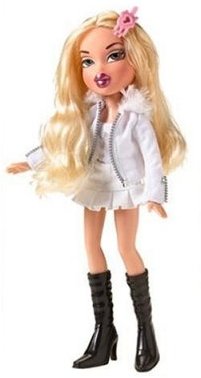 'Cloe' The article portrays the world’s top tennis players as if they were Bratz dolls, characters in an imaginary world of bling and beauty, the tennis a mere hobby on the side. In fact, I checked in on the Bratz website this morning, and realised that The Sunday Star Times article was just a grown-up version of Bratz Chatz. Let me share with you this morning’s inspiring Bratz Chatz: (Note to the uninitiated: Bratz dolls are marketed at girls age 2 – 11. There are five scantily clad, heavily made-up Bratz dolls, each with their own ‘personality’ and “passion for fashion”. This is the chat that occurred between the doll characters this morning) Sasha: Dancing is sooo much easier for me than sports. I love watching Cloe play [tennis] but it is so hard for me in gym. I have to sing to get through it! Jade: Yeah, I would much rather watch sports than play them but I get plenty of exercise walking around the mall every weekend, lol! Yasmin: Cloe convinced me to play tennis with her and I totally fell in front of Cloe’s very cute coach. I don’t know how she focuses on the game! Cloe: See? Good things come to those who work out! Btw, Yas was much better at tennis than she lets on. She’s got a mega strong serve. Sasha: Enough about the game! Who’s this new coach?? I think it’s time to set up a group hang for Cloe’s next match so we can scope out the guy! Cloe: Everybody chill! My tennis coach is awesome, he’s on the team at school, and we are JUST FRIENDS!! But I wouldn’t mind a cute outfit to wear, tee hee. Jade: Totally! And I’ll make her a new outfit because the last time I watched her play she was in ratty old sweats. So NOT cute! Yasmin: Ooh, I smell a makeover in the air! Not that our pal needs a makeover, since she’s cute enough on her own. Just a cool new look. So our young girls play make believe with sexy fashionista bimbos, and the media continues the conversation for our real life tennis heroes. Thank you Sunday Star Times, you made my search for discriminatory reporting of sport far too easy and time-efficient. I am horrified that it is 2010 and demeaning and offensive drivel like this is the only mention of sportswomen in New Zealand’s biggest newspaper of the week. I am heartened only by the fact that it was not a New Zealand journalist. Yet why the need to import this from the UK? I hope you will join me in emailing your dismay to the Sunday Star Times editor - [email protected]. (Note: I was unable to access a free version of this article that was written online, but it appears to be an edited version of an article that appeared in the Guardian UK on 19/06/10.) And while you are here check out this fantastic poem that covers a number of points raised in this post, and gives a call to action to all women: 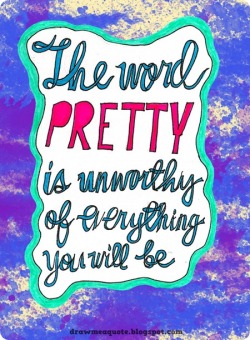 This is an extraordinarily powerful poetry performance by Katie Makkai defining the word "pretty", and the pressures faced by girls and women to define themselves by a narrow definition of "pretty". I love that it is calling for change and that it is raising awareness of the messages that mothers (and women in general) are passing on to their daughters. And the call to action at the end, a vow to her own 'someday- daughter' gave me goosebumps and tears. I invite you to watch the video below.  Dressed in a slinky red evening gown with long blonde hair, lengthy dark eye-lashes, sultry eyes and immaculate make up, Sasha Bennington looks every bit the glamour model ready to strut down the catwalk or pose for a fashion magazine cover. But Sasha is eleven; strip away the makeup and the sexy clothes, she is a little girl lost. Following on from Tuesday's 'Baby Beauty Queens' on 60 Minutes, last night 20/20 featured young Sasha and her family (from Manchester, UK). They were interviewed about Sasha’s “career” and their aspirations for her. It was a disturbing episode. With hundreds of dollars spent on her beauty regime every month, Sasha’s mother dreams of her daughter's future celebrity status – “I want Sasha to get every opportunity she can”. She seems to pay her daughter the ultimate compliment as she describes her looking “like one of those little Cindy dolls you play with”. After Sasha's mother described her daughter as confident and talented, when asked to describe herself, Sasha says “Three words to describe myself? – pretty, blonde, dumb... I am stupid”, followed by inane laughing of mother and daughter. Sasha later points out that “I don’t need a brain”. I acknowledge that such “current events” TV shows do often highlight the freaks and absurdities in our society, and I predict that the overwhelming majority of people who viewed this in NZ last night would share my views. Examples such as Sasha Bennington are the extreme: However, for many girls and young women growing up today, there is a similar pressure to achieve the looks and body of the models that surround us in magazines, TVs and billboards. It seems in many circles, the backlash against beauty contests, begun by the feminists in the 70s has well and truly turned full-circle. With our society obsessed with reality TV shows, offering the average punter their chance of “fame” and “making it”, is it any wonder that we are now seeing a resurgence in the popularity of beauty contests? For parents, they are the ideal training ground for such shows as Next Top Model, Idol etc. Sasha's take on it: “Like, 20 years ago, people cared about careers and stuff, but now it’s what you look like”. Such child beauty contests have not made it to NZ (that I am aware of), but a part of me thinks it is only a matter of time. I hope I am wrong. In the words of Kahlil Gibran, “beauty is not in the face; beauty is a light in the heart”. Child beauty pageants and all that surround them kill that light in the heart.  I was recently at a ‘style workshop’ and had been volunteered as one of the models to be 'made up' in front of an audience of business women – the goal was for me to be prepared (hair, makeup, clothes...) for a photographer to take some professional photos of me. I don’t consider myself very ‘stylish’ so it was a real treat! The presenter discussed having professional photos taken and the process of getting ready for them. She then added that with the wonders of photoshop, anything that wasn’t perfect could be fixed up. Until that moment, I hadn't ever considered photoshopping my own image. It was something that was done to celebrities and models. As I sat on the stage and looked at my image in the mirror, I suddenly saw the bags under the eyes, the crooked eyebrow... Hmmmm. The high-profile presenter was 50-ish, but joked that with the wonders of photoshop, she hadn’t really aged in the past 10 years and acknowledged that her publicity photos are a far cry from herself in ‘real life’. It got me thinking.
Do you have your image photoshopped? Why or why not? (PS: I have not ever had photos of me digitally altered. The main photo on my homepage is me complete with my smile-lines, forehead-creases and spots. But these are what make me, me. I have a red spot above my left eye which appeared in the first month of my pregnancy with my son (which resembles a pimple permanently threatening to break out... charming). It bugged me at first and I was assured it was hormonal and would disappear after the birth. Three years on, it has shown no sign of departing: but I like it. It is another mark on the journey of my life.) 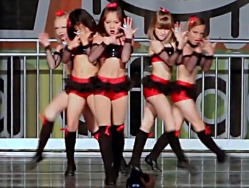 Last week a group of 9 & 10 year old girls gyrating their way through a sexy dance performance horrified many, me included. The girls are obviously talented dancers, but the sexy skimpy black lacy outfits combined with the provacative dance moves amount to a degrading and totally inappropriate performance. Facing widespread criticism, the girls parents have defended their daughters' performance: "The costumes are designed for movement and to show bodylines..." This interview makes the whole episode that much sadder for me. The parents seem to have missed the point entirely. As Danielle Miller, in the clip below points out, these girls are actually more scantily clad than Beyonce was in the original music video. I think one issue that this interview with the parents raises is how public our lives have become. Whereever your children are, whatever they are doing, there is a chance that their activities are being videoed and that this video could end up on the world wide web. If these girls had performed this dance a few years ago, it's highly unlikely anyone except the attendees would ever have seen it. However, it's 2010 and someone videoed the performance, put on YouTube and it went viral - it's now been viewed over 2 million times. The saturation of technology in our lives and the ease at which information can be spread across the world means that as parents we have to be ever more vigilant about protecting our children against exploitation. Thanks to Dannielle Miller for pointing me to this video. A powerful statement on the media's portrayal of women. It sent chills down my spine and tears to my eyes. 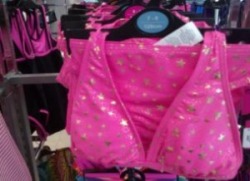 I love playing dress-ups; putting on a costume and becoming someone else for a while. As a girl, I remember finding great delight stomping round the house in Mum’s high-heels, her flowery skirts billowing up under my arms and beads trailing on the floor. Sometimes we’d pull on her old swimsuits and sarongs and pretend to be ladies at the beach. We were playing: we knew that those clothes weren’t little girls’ clothes. But the line between women’s fashion and girls fashion is blurred these days as the fashion industry has realised that young children are ripe targets for their marketing. The ‘girls’ fashion’ industry has boomed and has resulted in girls’ fashion simply being smaller sized versions of what teenagers and women are wearing. At face value, this doesn’t seem something we need to be concerned about. However when this means that lacy lingerie, sexy jeans and high heels are now seen in the ‘girls’ clothes section, I feel horrified. Yesterday, UK clothing chain store Primark withdrew from sale its range of padded bikini tops for girls as young as seven, following widespread criticism and outrage. The $4 bikini sets have been available in candy pink with gold stars and black with white polka dots. (Side note: Why do pre-pubescent girls need to wear bikinis anyway? In Europe I noticed most girls in similar swimming attire as boys until puberty – this made sense to me). Primark has apologised to customers for "causing offence" and said it would donate profits to a children's charity. The company refused to discuss the bikini's padding but an anonymous source “familiar with the product said the extra fabric was designed to preserve a girl's modesty and prevent any signs of a developing breast from showing through”. ‘Preserve a girl’s modesty’!!! What an oxymoron. By tying a padded bra on them? Need I say more. Even more saddening, this comment furthers the attitude that somehow girls developing bodies are somehow shameful. A number of UK politicians have condemned Primark for stocking such a bikini and several people have referred to the bikini as the “paedo-bikini.” But this phrase seems to be implicating girls for the behaviour of paedophiles, which in turn minimises the blame on the perpetrator. Girls and the clothes they wear are not to blame for paedophilia: paedophiles are to blame for paedophilia. As the American Psychological Association (2007) report on the sexualisation of girls stated, "If girls purchase - or ask their parents to purchase - products and clothes designed to make them look physically appealing and sexy, and if they style their identities after the sexy celebrities who populate their cultural landscape, they are, in effect, sexualising themselves." Mumsnet (UK) have launched a Let Girls Be Girls campaign. This campaign asks retailers to pledge not to sell products that prematurely sexualise children. They have an excellent list of reasons why we all should be worried about the sexualisation of girls clothing:
The upside to the Primark bikini debacle is that the media outrage has been universal. No one is suggesting that on any level are these bikinis acceptable. Let's take this opportunity to take a stand against the companies marketing sexualised clothing. On a personal level let's ensure that we all consciously clothe our children: they are children and they don't deserve to be sexualised. |
AuthorRachel is a writer and educator whose fields of interest include sexuality education, gender, feminism and youth development. Archives
November 2023
Categories
All
|

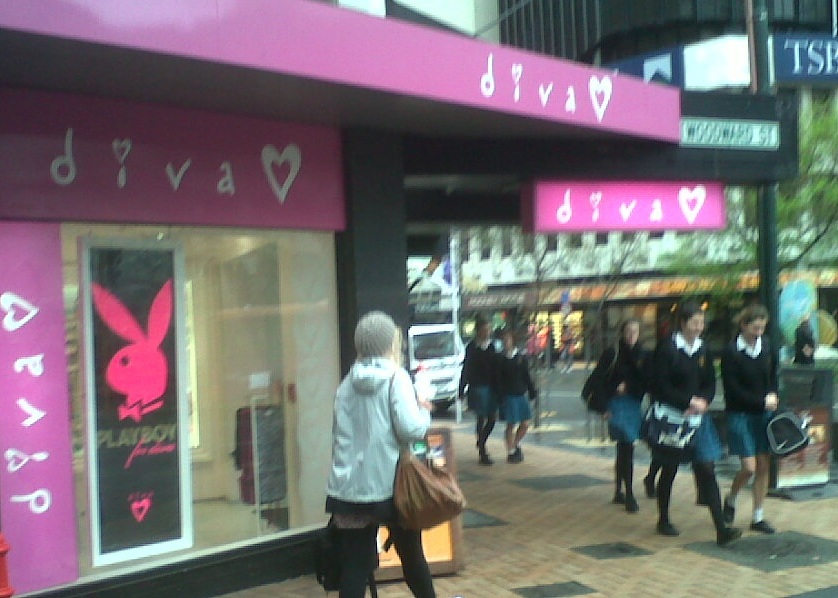
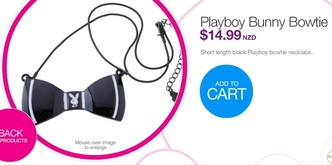
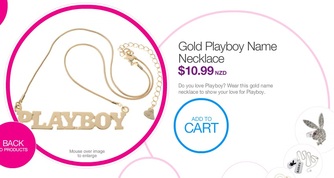
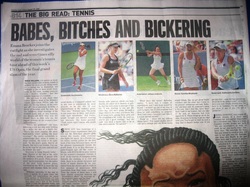
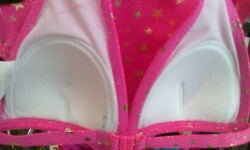
 RSS Feed
RSS Feed




